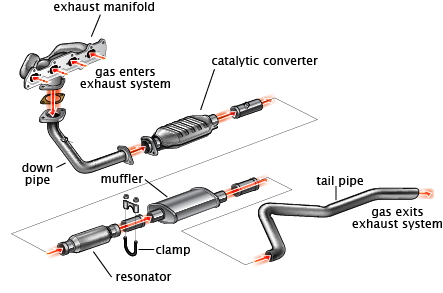Exhaust System

Did your vehicle fail emissions or does it sound different than normal? You may have an issue with your exhaust system. Give us a call today to get your vehicle inspected.
LEARN ABOUT THE EXHAUST SYSTEM:
The exhaust system in a vehicle is responsible for directing harmful gases produced during combustion away from the engine and out of the vehicle, while also reducing emissions and controlling noise. It consists of several key components, each of which plays a specific role in ensuring the engine runs efficiently, the vehicle is environmentally friendly, and noise is kept to a minimum. Here's a breakdown of the major parts of the exhaust system and their importance:
1. Exhaust Manifold
- Purpose: The exhaust manifold is the first part of the exhaust system that collects exhaust gases from the engine’s cylinders and funnels them into the rest of the exhaust system.
- Importance: It helps direct the flow of exhaust gases, ensuring they are efficiently channeled into the rest of the exhaust system. A damaged or cracked manifold can lead to poor engine performance, reduced fuel efficiency, and excessive noise.
2. Oxygen Sensors
- Purpose: Oxygen sensors monitor the level of oxygen in the exhaust gases. There are typically two types: upstream (pre-catalytic converter) and downstream (post-catalytic converter) sensors.
- Importance: Oxygen sensors provide feedback to the engine control unit (ECU), allowing it to adjust the air-fuel mixture for optimal combustion. This improves fuel efficiency, reduces emissions, and ensures the vehicle passes emissions tests. A faulty oxygen sensor can lead to increased fuel consumption and higher emissions.
3. Catalytic Converter
- Purpose: The catalytic converter is a key component that reduces harmful emissions by converting toxic gases into less harmful substances. It uses a catalyst (usually platinum, palladium, and rhodium) to facilitate chemical reactions that convert:
- Carbon monoxide (CO) into carbon dioxide (CO2)
- Nitrogen oxides (NOx) into nitrogen (N2) and oxygen (O2)
- Hydrocarbons (HC) into carbon dioxide (CO2) and water (H2O)
- Importance: It significantly reduces the harmful pollutants emitted by the engine, helping the vehicle comply with environmental regulations and lowering its environmental impact. A malfunctioning catalytic converter can lead to poor engine performance and increased pollution.
4. Muffler
- Purpose: The muffler is designed to reduce the noise produced by the engine’s exhaust gases as they exit the system.
- Importance: It helps keep the vehicle’s noise level within legal limits, reducing the sound of the engine’s exhaust pulses. A damaged muffler can lead to louder-than-normal engine noise, which is not only annoying but can also attract attention from law enforcement if it exceeds legal noise levels.
5.Resonator (Optional)
- Purpose: The resonator is often located between the muffler and the exhaust manifold and works in conjunction with the muffler to further reduce noise. It eliminates specific sound frequencies that cause unwanted noise, providing a smoother exhaust note.
- Importance: While not present on all vehicles, a resonator can help fine-tune the sound of the exhaust, further reducing noise levels. It can also enhance the efficiency of the exhaust system when combined with the muffler.
Summary of Importance of the Exhaust System:
- Emissions Control: The exhaust system is vital for reducing the harmful gases emitted by the engine, helping to meet environmental standards and reduce the vehicle’s carbon footprint.
- Engine Efficiency: Components like the oxygen sensor and catalytic converter ensure that the engine runs efficiently, optimizing fuel consumption and minimizing pollution.
- Noise Reduction: The muffler and resonator keep noise levels in check, ensuring the vehicle meets legal sound standards and providing a more pleasant driving experience.
- Safety: Properly functioning exhaust components prevent toxic gases, such as carbon monoxide, from leaking into the vehicle's cabin, which can be hazardous to the driver and passengers.
Regular maintenance of the exhaust system—such as checking for leaks, replacing damaged parts, and ensuring the catalytic converter and muffler are functioning correctly—is essential for both vehicle performance and environmental responsibility.